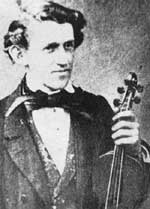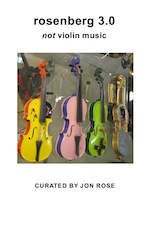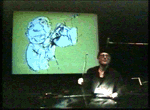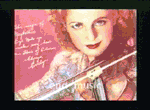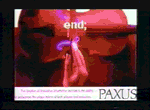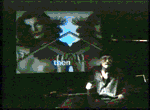 | |||||||

|
rosenberg 3.0 not violin music last book of the trilogy |
|
|
If the two previous volumes Pink Violin and Music in the Age of Shopping upset, confused, and entertained the music industry and cultural commentators, rosenberg 3.0, through a series of allegorical and insightful articles, will help ease the pain as the practitioners of music scratch their heads working out their next survival move. rosenberg 3.0 - not violin music is a pseudonymous violin arcana compiled by Jon Rose from an extremely diverse array of musicians, fans and eccentrics, all deriving from the activities of the late lamented virtuoso Dr Johannes Rosenberg, rosenberg 3.0 is the very final volume in as weird and twisted a trilogy of cultural critique as you are ever likely to encounter. Read the Sydney Morning Herald review HERE. Read the RealTime review with a wild comments page HERE. Despite being deceased and residing in a coffin for over 20 years, the contemporary thoughts and theories of Dr. Johannes Rosenberg live on and are available on facebook. Now: time to mess with your brain, and this will help, buy the BOOK! 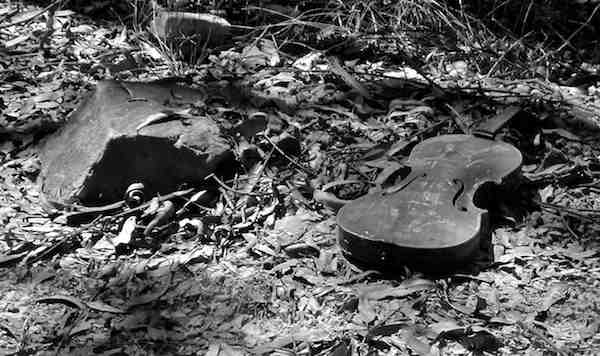 Definitions of music in the 21st century: these responses arrived too late for the publishing deadline (the book itself contains 150 defintions of music in the 21st century), apologies to the contributors, and here are the rest: Music will consume us before we consume it. Steve Elkins Any artistic, human expression where sound is the major constituent. Any sound source, whether created, intentional, extraneous, manipulated or otherwise, and including silence (as relating to the absence of intentionally produced or perceivable sound), as well randomly occurring acoustic events, are all viable constituent parts of a work considered music, if they are framed, in a temporal sense, and deemed significant or useful tools contributing to the fulfilment of the artistic vision, by the artist. (It's music if the artist says it is! ) Other elements that could be considered part of musical expression, outside of the sound world, include gesture and movement (derived from the act of sound production or otherwise), the expression and/or illustration of elements within the musical framework, such as rhythm or phrasing (foot-tapping, swaying), vocal enunciation (voluntary or otherwise), as well as different types of pose, poise and other theatrical conceits. Tony Buck Music. Everything you think it is, and more. Music. Everything you think it isn't, and more. Cazzbo For me 'music' is defined by the aesthetical experience of any acoustic event, even the sound of silence. Heiner Goebbels Jon's email coincided with an article in the Observer by former New Musical Express journalist and Frankie Goes to Hollywood promoter Paul Morley called 'Pop belongs to the last century. Classical music is more relevant to the future'. In it Morley argues 'Now, with all music available instantly, and pop more a nostalgic, preservative practice rather than one anticipating and demanding change, classical music comes to fresh, forward-looking life'. According to one of the comments, Morley was paid by either the BBC or Channel 4 to do a course in classical composition at the Royal Academy of Music so that he could make a documentary series about classical music. Morley also states, with some justification: 'It is machines that are now the new pop stars, the performers and singers like traveling sales workers whose ultimate job is to market phones, tablets, consoles, films, brands and safely maintain the illusion that the world is just as it was when there was vinyl and the constant, frantic turnover of talent, genre and style'. I've always found Morley more than a bit of a tosser, especially his book Words and Music: the history of pop in the shape of a city, in which he keeps switching irritatingly between Alvin Lucier's 'I am sitting in a room' and Kylie Minogue's 'Can't Get You Out of My Head'. With all the zeal of a recent convert, Morley cites six works of future significance, all of them over fifty years old: Mozart's Masonic Funeral Music in C Minor (1785), Debussy's Sonata for Cello and Piano in D minor (1915), Berio's Sequenza V (1966), Shostakovich's Symphony No 10 (c1953), Webern's Langsamer Satz (1905), and Earle Brown's Times Five (1963). Of this last work, he states: 'For those looking for the missing link between Mozart and Madlib, it's abstract (classical) music for a phantom, post-real space age that is yet to happen, but seems scheduled to happen soon, and where most pop and rock will seem very dull and dated'. A very conservative range of choices, to say the least. And musical genres seem increasingly irrelevant to music of the 21st century. But one thing I do agree with is a welcome return to the sound of musical instruments rather than electronic knob-twiddling and auto-tune. Tony Mitchell Give me a bit of time, Jon, will think about it, actually - do it all the time, most difficult question. Peter Broetzmann The practice of music in the 21st century increasingly (at the speed of the internet) demonstrates the hierarchies of celebrity, or defends positions of the few favoured inheritors of cultural power and wealth (usually combined with political clout). The rest is not noise but musical praxis pushed to the edges of social obscurity where it can do no good or harm - if indeed it can survive at all. Ross Alexander You can talk and write about music but that's not music. Gary France Composing: bringing into being a sound-event that was previously, for the composer, intolerably absent from the world. Music: sound pre- or post-organised by a mind to reveal (un)intended structures. Chris Dench The most apt single response that I could come up with was another question -'who's asking?' Mike Nock Music = ideas + sensation Peggy Polias Music in the 21st century, as far as I look upon it, is the attempt to cope with the struggle of the individual music performer and/or composer with material, time and flow to aim at exploring and finding out what else exists, with regard to human relationships, that is beyond words and economy. Thereby, the music performer and/or composer interacts with 1) oneself, 2) the group one is working with and 3) the audience. In the best case, this work generates values of great impacts on both a socio-cultural and on a socio-political level. If seriously encouraged and supported, music can play a crucial role in shaping a human society. In fact, considering the perturbations of our times, I would like to take it even one step further and claim that music in the 21st century must develop a radical quality, in order to have an impact at all, and remind ourselves of the current status quo and the inevitable fact that the human beings have to meet tremendous challenges by dealing with crises, change and transitions, probably more than ever before. Alex Nowitz I define music as any combination of acoustic energy that attracts a physical response in its listener. Lucas Abela Music is of the soul and from the soul, an expression of life through sound which is either melodic or non melodic or both. Ros Dunlop The Sydney Symphony Orchestra welcomes the growth opportunities of the 21st Century and is planning another tour of gala concerts and banquets, featuring as we did in 2009, great Australian contemporary music such as Elgar and Tchaikovsky. SSO programming is always looking to the future, and China is a huge market. SSO marketing Music...an unanswerable question; and isn't that wonderful! Daryl Buckley Ms Eimana Merkin, the founding editor of Australia's Lime Lite magazine (a suppository of all classical music wisdom and circulated amongst the wealthy of Woollahra and Toorak), has said that with regard to 21st century music, Johannes Rosenberg was the most interesting violinist turned competitive dead musician she had ever encountered. What set Rosenberg apart from other competition players, drawled Ms Merkin adjusting her twinset and swastika pendant, was unquestionably his odour: 'It's very difficult to convey his essence in print, even with a magazine as proudly overlaid with elite standards of excrement as ours...but suffice to say that Rosenberg was an arrestingly mephitic presence'...(he) was always intrigued to know that he was directly related to the great philosopher Immanuel Kant by way of Kant's little-known illegitimate offspring...The boy (known affectionately by his contemporaries as 'that utter Kant') lived his life as a double negative connector working for Snap-on Tools, becoming the inspiration for Offenbach's 'Can Can' during a drunken absinthe orgy in 1869, and also later in life becoming the founding father and mother of the Australian Liberal Party in 1909. Australia's current Prime Minister is a direct descendant (more doo doo than can can), as his main character trait of being twice the Kant of other Kants indubitably attests...Johannes Rosenberg's extraordinary capacity for instrument transformation is stunningly evident in the use of two Steinways to create an instrument he ordained the 'Hamburger' (is this 'Can Can' or 'Doo Doo'? ed.). The instrument is now housed permanently for OHS reasons in the Museum of Musical and Comestible Instruments in Prague (or Pargue, as it was known in the Osteo-Dyslexic Empire). Sadly space does not permit an illustration of this wondrous keyboard tumour. This unique instrument has very profound significance for all Australian oviparous musicians, as it indicates the dietary reasons why Australian classical musicians convince themselves to play German music to Germans when in Germany in case Germans don't know how it sounds. It also explains why it is not preserved anywhere in Australia, as Australia has one of the highest rates of hamburger consumption in the world.(extracts only) Professor Winceyette Gusset-Truss WTF Music to me is any sound or collection of sounds existing both physically and/or imagined that I frame as music chiefly from a phenomenologically and/or ontologically viewpoint. Colin Black Music is sound stuff with the right frequency. Sally Jane Norman We are creating a monophonic culture which addresses itself in grey and monotonous tones. Nothing is left to chance, talent is unrequired, the territory of experience is controlled, reduced and cheaply sold. But for those who would deal with fate, there are still the boundaries of desire where the logic of meaning evaporates. Rosenberg Memorabilia. page 205. The Pink Violin. 1992. NMA, Melbourne. See what an instrument/soundmaker does, see what you do upon it, do it & music tends to emerge Mark Stewart I will have to think of a definition of 21st century music that would make sense to me, that isn't ridiculously conceited, or plainly ridiculous. And the question is, what IS music? Is it what you choose to hear? Is it what others (eg music industrials) have chosen that you can get to hear? Is it what The Wire tells its readership is suitable to hear if they want to be counted among the chosen ones? How is all that different from before the 21st century? In what way has my idea or definition of music changed since the new century started? Rene Van Peer Be 21st century stones: if polishing stones can be art, maybe the stones all around us are thinking the same. Thinking connections, thinking good things. Stones can be transformed into architecture or ancient biblical books. Breaking stones just gives us more stones - they are in essence irreducible. At certain speeds stones can skim across the water thus calling into question the phrase "sink like a stone". If throwing stones can demonstrate musical intent, then why not "sing like a stone". Peace. Wu Fung Fei The band will continue to drone and groan on, louder and longer than ever, on and on, into the 21st century. We are all now irreparably deaf and so are our fans, just like the boomers who listened to The Soft Machine. The future of music is doom metal and you are on the way to hell - Ahhhhh! Sun Music is our attempt to interpret our humanity- riddled with flaws and engorged with potential - as it is reflected in the universe. Elizabeth Welsh The dead ear hangs limp, puss oozes, the damage done, over exercised and extended, an avalanche of crushed sounds, compressed and boring into orifice and out t'other side, bored to deaf. Andy McTaggart What to say after countless attempts to define something which is undefinable. I think no other person than you could provoke me to try a statement of what I don't believe it would make sense. Ich denke, es gehoert zum groessten Luxus der Menschheit, sich so etwas wie Musik leisten zu koennen. Zugleich sagt es etwas aus ueber die conditio humana: Wir sind mehr als zweckbestimmte Wesen. Uns dessen in der Musik bewusst zu werden, birgt ein Stueck des Gluecks in sich. Bert Noglik In the 21st century, music is the only thing that one voluntarily listens to. Marie Goyette Music is not universally definable as it's not a natural kind, but rather a conglomerate of many definable components, the boundaries of which are flexible. For me, music is a way of making time and interaction more magical by being present together in the eternal now through focused stylisation of language (which may be expressed through surrogate sound-makers). In the 21st century it's more pluralistic and connected than ever. Robert Davidson Somebody (I do not know who, but statistically somebody must have) said that music is the algorithmic shaping of time. To me, that is a very adequate definition of music. I don't quite understand what it means, I just like the sound of it. Jo Santy Music is anything that is beautiful. There is music in dance, painting, poetry. There is music in feeding the hungry and giving to the poor. Man did not invent music, it was here before we arrived and will be here after we are gone. Music sometimes manifests itself as sound. William Parker To be a musician in the 21st century is to be like Jay Gatsby. "There [is] something gorgeous about [us], some heightened sensitivity to the promises of life, as if [we] were related to one of those intricate machines that register earthquakes ten thousand miles away. This responsiveness [has] nothing to do with that flabby impressionability which is dignified under the name of the "creative temperament"- it [is] an extraordinary gift for hope, a romantic readiness [not] found in any other person." Music is a lost language we speak only to each other. Nobody else understands or cares, unless perhaps like Lady Gaga we arrange to be vomited upon. They can't afford to. Canned music is so ubiquitous, so insidious we have to tune it out in order to function, like polluted air we have to filter in order to breathe. Yet we keep singing, for nothing else resonates in us so deeply. Music is the very breath of our life. "So," like Gatsby, "we beat on, boats against the current, borne back ceaselessly into the past." Denman Maroney On problem surface, impression is that music in 21st century has bifurcation into kaleidoscope of genres and sub genres. So sum of all these parts is less that its constituents - not more. Serious result is post Soviet mayhem where (as with all digital process) everything is interchangeable with everything else - although talent challenged celebrity now rules roostings. Yes. If you look to edges of our motherland culture(s) there is still much to finding that is challenge. By contradiction, Facebook and rest of it really not helping either survival or creativity of these splendid outcasts. Live music is buried in disgusting of oligarch babies, sex scandal, food (still obsessing after traditional years of empty shelves) and Kremlin nostalgia; more the easiness of documented availability, less desire to jump into raging water and learn to swim. As old russian folk song suggests - only a dead fish swims with stream. Vladimir Shapovalov Hey man, let's trade...like some of my play list, and in exchange I'll authenticate your sounds. You dig? Like it's no use having your own personal non-sequenced cool sounds unless I can activate them to my global fan base. Then we are talking mutual lateral consumption of the ontological situation - aka - the authentic groove moment. Let me give you an example value from my recent global experiential: By incorporating the Antarctic sonosphere, in terms of an epistemological bio function of a post human fractal existence, into my production schedule, I have brought the reality of that hyperkinetic coolness into the consciousness of the 21st century musical continuum and vibe. Before I validated that awesome "whiteness" of that T.S. Elliot wasteland, it didn't exist. Dig? DJ Spooky When we refer to the practice of music in the 21st century, we are dealing in the main with acoustic accoutrements and sonic excess baggage, considered somewhat loud in character and whose existence challenges the very basis of occupational safety and health in our society. The most commonly used music is a potential source of harm or adverse health effect on a person or persons' in the vicinity. The terms 'music' and 'risk' are often used interchangeably, especially when dealing with public liability insurance cover. (delivered by an anonymous hand, but thought to be a hand insured by HIH) Music - if not now, then when (is this too late?) David Watson |
 |
